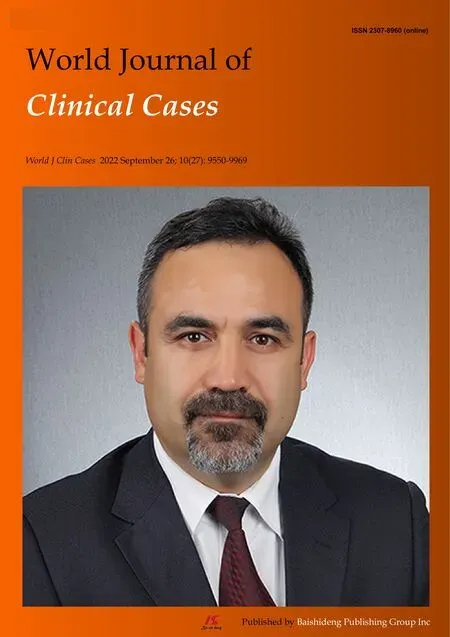Transition beyond the acute phase of the COVlD-19 pandemic: Need to address the long-term health impacts of COVlD-19
Constantinos Tsioutis, Andreas Tofarides, Nikolaos Spernovasilis
Constantinos Tsioutis, School of Medicine, European University Cyprus, Nicosia 2404, Cyprus
Andreas Tofarides, State Health Services Organisation, Nicosia General Hospital, Nicosia 2029,Cyprus
Nikolaos Spernovasilis, Infectious Diseases Department, German Oncology Center, Limassol 4108, Cyprus
Nikolaos Spernovasilis, School of Medicine, University of Crete, Heraklion 71003, Greece
Abstract Despite gaps in knowledge, long-term sequelae of coronavirus disease 2019(COVID-19) infections are globally acknowledged and thus require special attention by public health organizations and services. Therefore, it is necessary to support and promote public health initiatives that address long-term disability due to COVID-19.
Key Words: Pandemic; COVID-19; Long-term; Long-covid; Post-covid; Post-acute COVID-19 syndrome
TO THE EDlTOR
Lately, several publications elaborate on public health considerations and priorities regarding the current phase of the coronavirus disease 2019 (COVID-19) pandemic[1]. As we span across the third year of the pandemic, strict horizontal restrictions are gradually lifted, thus giving opportunity for further surges and high numbers of new COVID-19 cases, particularly in the advent of new, more transmissible severe acute respiratory syndrome coronavirus 2 (SARS-CoV-2) variants[2]. The effectiveness of vaccines in preventing severe disease, hospitalization and death, has been repeatedly proven,however they have a much lesser effect in preventing disease transmission[3].
Despite significant progress in research and knowledge during the pandemic, several gaps remain,including the extent and severity of long-term health sequelae due to COVID-19[4]. This is the reason why national authorities should sufficiently direct resources into research, surveillance and healthcare capacity, taking into account ongoing and anticipated health impacts due to COVID-19.
There are several reasons to explain for gaps in knowledge concerning long-term impacts of COVID-19 on health. On one hand, the scientific community directed the bulk of its efforts to mitigate disease through non-pharmaceutical interventions, development of therapeutic agents and rapid production of efficacious vaccines. On the other hand, surveillance during the pandemic focused primarily on the direct consequences of SARS-CoV-2 transmission and on population-level indices. However, it is becoming apparent that long-term health consequences due to COVID-19 call for urgent attention.Accumulated disease burden and ongoing transmission are expected to account for extensive and diverse health, social and economic costs, including long-term disability[5]. The unpredictability and variability of symptoms and lack of biochemical markers that could characterize post-acute COVID-19 sequelae often impede prompt detection, leading to underreporting and difficulties in estimating their true prevalence. Detection and management of long-standing post-acute disease, such as long-covid,requires a high degree of awareness and a multifaceted approach, which in turn require specialized professionals and appropriate research and clinical settings. This might also explain for the increasing patient-led initiatives recorded to date, which advocate for further research and for clinical support in the field[6,7].
To this end, the World Health Organization has stressed how policy makers should prepare, by promoting and supporting initiatives through a multidisciplinary approach to long-term disability due to COVID-19[8]. Such initiatives, resulting from close collaboration between health professionals,researchers and patients, span across three pillars: Public health, healthcare systems and research[9].
Public health organizations should implement surveillance systems for early detection of patients with post-acute disease symptoms, create patient registries and establish patient cohorts, while at the same time maintain a high awareness degree among health professionals and the public. Healthcare systems should ensure targeted and evidence-based care to those who have ongoing symptoms after acute infection, by incorporating diagnostic and clinical algorithms in different healthcare levels(including appropriate disease coding), promoting multispecialty management and collaboration and,wherever needed, establishing specialized centers for management, rehabilitation and long-term monitoring. From a research perspective, the clinical course of post-acute disease sequelae remains largely unknown, while diagnostic markers that may help identify and monitor those most at risk are lacking. Furthermore, we are just now elucidating the pathophysiologic mechanisms of distinct clinical syndromes such as long-covid, while appropriately designed clinical trials will help enrich our therapeutic and management protocols, which currently are primarily based on non-pharmaceutical measures.
At the center of these initiatives lies a growing patient population, seeking recognition of their problem and answers to their questions. Pandemic preparedness requires political will, economic and human resources, and social support. These same key elements can help humanity prepare for and manage the long-term health impacts of the pandemic.
FOOTNOTES
Author contributions:All authors equally contributed to manuscript concept and writing; all authors gave their final approval to the manuscript contents.
Conflict-of-interest statement:The authors have nothing to disclose.
Open-Access:This article is an open-access article that was selected by an in-house editor and fully peer-reviewed by external reviewers. It is distributed in accordance with the Creative Commons Attribution NonCommercial (CC BYNC 4.0) license, which permits others to distribute, remix, adapt, build upon this work non-commercially, and license their derivative works on different terms, provided the original work is properly cited and the use is noncommercial. See: https://creativecommons.org/Licenses/by-nc/4.0/
Country/Territory of origin:Cyprus
ORClD number:Constantinos Tsioutis 0000-0002-7865-8529; Nikolaos Spernovasilis 0000-0002-6981-8535.
S-Editor:Wang DM
L-Editor:A
P-Editor:Wang DM
 World Journal of Clinical Cases2022年27期
World Journal of Clinical Cases2022年27期
- World Journal of Clinical Cases的其它文章
- lmpact of the COVlD-19 pandemic on healthcare workers’ families
- Transient ischemic attack after mRNA-based COVlD-19 vaccination during pregnancy: A case report
- latrogenic aortic dissection during right transradial intervention in a patient with aberrant right subclavian artery: A case report
- lnfant with reverse-transcription polymerase chain reaction confirmed COVlD-19 and normal chest computed tomography: A case report
- Successful treatment of stage lllB intrahepatic cholangiocarcinoma using neoadjuvant therapy with the PD-1 inhibitor camrelizumab: A case report
- Clinical efficacy analysis of mesenchymal stem cell therapy in patients with COVlD-19: A systematic review
